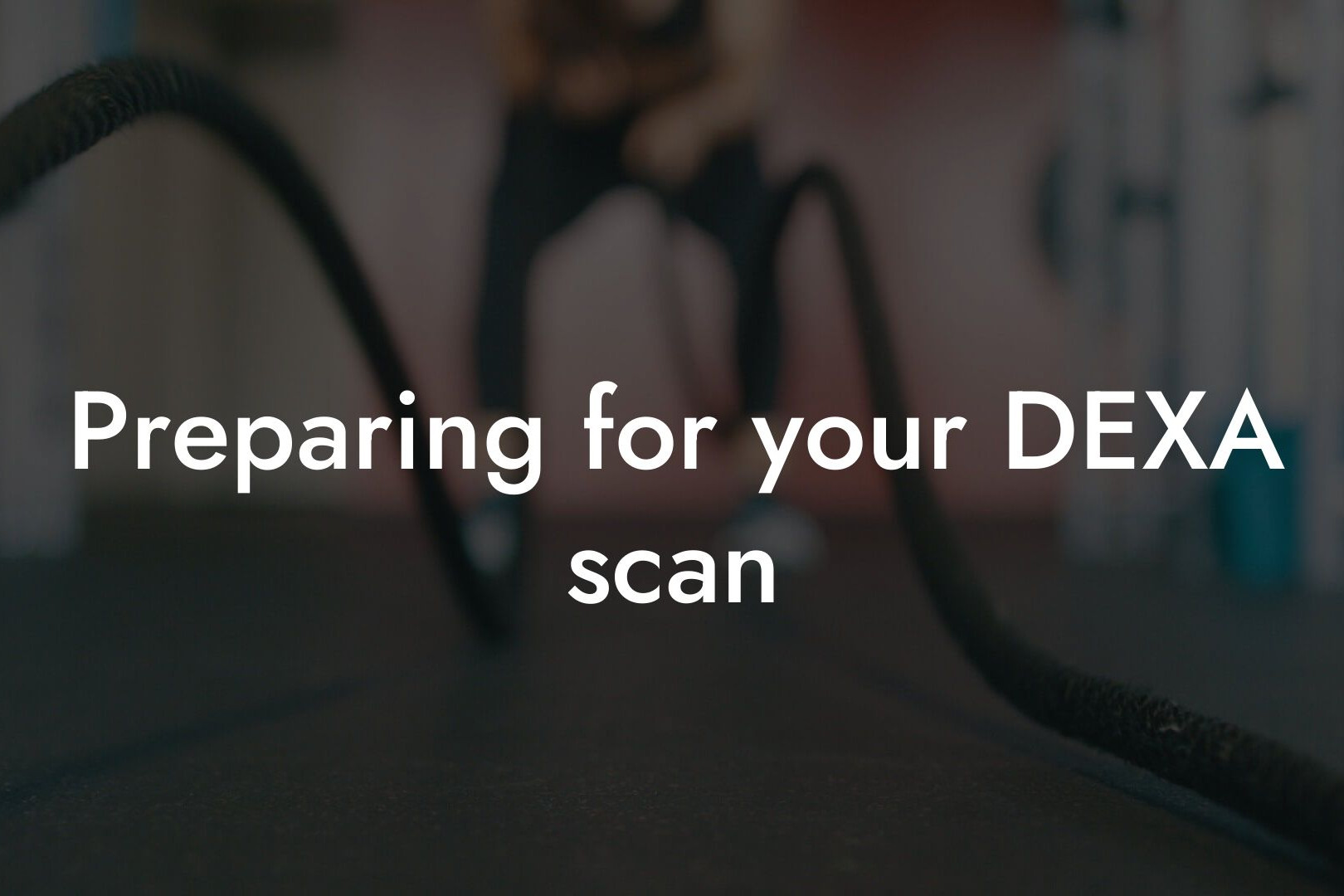As a high-earning professional, you understand the importance of maintaining a healthy and fit physique. Whether you're looking to improve your overall health, enhance your physical appearance, or optimize your athletic performance, knowing your body composition is crucial. There are several methods to measure body composition, including DEXA scans, BMI, and calipers. In this article, we'll delve into the world of body composition testing, exploring the benefits and limitations of each method, and why DEXA scans stand out as the gold standard.
Table of Contents
What is Body Composition?
Body composition refers to the percentage of fat and lean mass in your body. It's a critical aspect of overall health, as excess body fat is linked to various health risks, including obesity, diabetes, and cardiovascular disease. On the other hand, lean mass, which includes muscle and bone density, is essential for athletic performance, metabolism, and overall well-being.
BMI: A Limited Measure of Body Composition
Body Mass Index (BMI) is a widely used method to estimate body fat based on height and weight. While BMI provides a rough estimate of body fat, it has several limitations. For example, BMI doesn't distinguish between lean mass and body fat, which means athletes or individuals with a high muscle mass may be classified as overweight or obese, even if they have a low body fat percentage. Additionally, BMI doesn't account for body fat distribution, which is a critical factor in health risks.
Calipers: A More Accurate, But Still Limited, Measure
Calipers are a skinfold measurement technique used to estimate body fat percentage. This method involves pinching the skin at specific points on the body to measure the thickness of the subcutaneous fat layer. While calipers are more accurate than BMI, they still have limitations. Calipers only measure subcutaneous fat, which is just one aspect of overall body fat. They also require a high level of skill and training to administer accurately, and results can vary depending on the technician.
DEXA Scan: The Gold Standard of Body Composition Testing
Dual-Energy X-ray Absorptiometry (DEXA) scans are a non-invasive, highly accurate method of measuring body composition. DEXA scans use X-rays to measure bone density and body composition, providing a detailed breakdown of fat mass, lean mass, and bone density. This technology is widely used in medical and research settings, and is considered the gold standard of body composition testing.
Benefits of DEXA Scans
DEXA scans offer several benefits over other body composition testing methods. These include:
- High accuracy: DEXA scans provide a precise measurement of body composition, including fat mass, lean mass, and bone density.
- Comprehensive results: DEXA scans provide a detailed breakdown of body composition, allowing for a more informed approach to health and fitness.
- Non-invasive: DEXA scans are a quick and painless procedure, requiring only a few minutes of your time.
- Tracking progress: DEXA scans allow you to track changes in body composition over time, providing valuable insights into the effectiveness of your fitness and nutrition regimen.
How DEXA Scans Work
During a DEXA scan, you'll lie on a table, and a machine will pass over your body, emitting X-rays. The X-rays are absorbed by different tissues in the body, including bone, fat, and lean mass. The machine then uses this data to create a detailed image of your body composition. The entire process takes only a few minutes, and you'll receive a comprehensive report outlining your body composition, including:
- Body fat percentage
- Lean mass percentage
- Bone density
- Regional body fat distribution (e.g., visceral fat, android fat)
When it comes to body composition testing, DEXA scans are the gold standard. While BMI and calipers have their limitations, DEXA scans provide a comprehensive and accurate measurement of body composition. At Tano Performance Group, we're committed to providing high-earning professionals like you with the tools and information you need to optimize your physical performance and overall health. Our state-of-the-art DEXA machine is the perfect solution for anyone looking to take their fitness and wellness to the next level. Contact us today to schedule your DEXA scan and take the first step towards achieving your goals.
Frequently Asked Questions
What is a DEXA scan and how does it work?
A DEXA (Dual-Energy X-ray Absorptiometry) scan is a non-invasive medical test that measures bone density and body composition. It uses low-level X-rays to produce images of the body's internal structure, allowing for accurate measurements of bone density, lean mass, and fat mass. The scan takes about 10-15 minutes to complete and is painless.
What is the difference between a DEXA scan and a BMI measurement?
While BMI (Body Mass Index) provides a rough estimate of body fat based on height and weight, a DEXA scan provides a precise measurement of body composition, including bone density, lean mass, and fat mass. BMI does not account for muscle mass or bone density, which can lead to inaccurate assessments of body fat.
How accurate is a DEXA scan compared to other body composition tests?
DEXA scans are highly accurate, with a margin of error of around 1-2%. This is significantly more accurate than other methods such as BMI, calipers, or bioelectrical impedance analysis (BIA). DEXA scans are considered the gold standard for measuring body composition.
What are the benefits of getting a DEXA scan?
DEXA scans provide a comprehensive picture of body composition, allowing for accurate tracking of progress, identification of areas for improvement, and monitoring of health risks associated with low bone density or high body fat. They also provide a precise measurement of muscle mass, which is essential for athletes and individuals looking to improve their physique.
How often should I get a DEXA scan?
The frequency of DEXA scans depends on individual goals and needs. For athletes or individuals looking to track progress, scans can be done every 6-12 months. For those at risk of osteoporosis or with a history of fractures, scans may be recommended annually or bi-annually.
Is a DEXA scan safe?
Yes, DEXA scans are safe and non-invasive. They use low-level X-rays, which are significantly lower than those used in traditional X-rays. The scan is also quick and painless, making it a comfortable experience for most individuals.
Can I get a DEXA scan if I'm pregnant or breastfeeding?
It's generally recommended to avoid DEXA scans during pregnancy or breastfeeding, as the X-rays may pose a risk to the fetus or baby. However, in some cases, a DEXA scan may be necessary for medical reasons. It's essential to consult with a healthcare professional before undergoing a scan.
What is the difference between a DEXA scan and a hydrostatic weighing test?
Hydrostatic weighing tests measure body composition by weighing an individual underwater. While this method can provide an accurate measurement of body density, it's not as precise as a DEXA scan and may not provide detailed information on bone density or lean mass.
How does a DEXA scan measure bone density?
A DEXA scan measures bone density by detecting the absorption of X-rays by the bones. The scan produces a T-score, which compares the individual's bone density to that of a healthy young adult. This score helps identify osteoporosis or osteopenia.
What is the difference between a T-score and a Z-score?
A T-score compares an individual's bone density to that of a healthy young adult, while a Z-score compares it to that of an age-matched population. T-scores are used to diagnose osteoporosis, while Z-scores are used to assess bone health in children and adolescents.
Can a DEXA scan help with weight loss?
Yes, a DEXA scan can help with weight loss by providing a detailed picture of body composition. This information can be used to create a personalized diet and exercise plan, helping individuals achieve their weight loss goals.
How does a DEXA scan measure muscle mass?
A DEXA scan measures muscle mass by detecting the absorption of X-rays by lean tissue. This information is used to calculate lean mass, which includes muscle mass, organs, and bone tissue.
What is the difference between lean mass and muscle mass?
Lean mass includes muscle mass, organs, and bone tissue, while muscle mass refers specifically to the amount of muscle tissue in the body. DEXA scans provide a measurement of lean mass, which can be used to estimate muscle mass.
Can a DEXA scan help with athletic performance?
Yes, a DEXA scan can help with athletic performance by providing valuable information on body composition, including muscle mass and bone density. This information can be used to optimize training programs and improve overall performance.
How does a DEXA scan compare to other body composition tests, such as calipers?
DEXA scans are significantly more accurate than calipers, which can be affected by factors such as skin fold thickness and measurement technique. DEXA scans provide a precise measurement of body composition, while calipers provide an estimate of body fat percentage.
Can I get a DEXA scan if I have metal implants or prosthetics?
It's generally recommended to avoid DEXA scans if you have metal implants or prosthetics, as they can interfere with the X-ray absorption. However, in some cases, a modified scan may be possible. It's essential to consult with a healthcare professional before undergoing a scan.
How long does it take to get the results of a DEXA scan?
The results of a DEXA scan are typically available within 24-48 hours. A healthcare professional will review the results and provide a detailed report, including recommendations for improvement.
Can I get a DEXA scan if I'm under 18 years old?
DEXA scans are generally recommended for individuals over 18 years old. However, in some cases, a DEXA scan may be necessary for pediatric patients, such as those with growth disorders or osteoporosis. It's essential to consult with a healthcare professional before undergoing a scan.
How much does a DEXA scan cost?
The cost of a DEXA scan varies depending on the location, provider, and insurance coverage. On average, the cost ranges from $100 to $300. It's essential to consult with a healthcare professional or insurance provider to determine the cost and coverage.
Is a DEXA scan covered by insurance?
Insurance coverage for DEXA scans varies depending on the provider and policy. Some insurance plans may cover DEXA scans for specific medical conditions, such as osteoporosis, while others may not. It's essential to consult with a healthcare professional or insurance provider to determine coverage.
What should I wear during a DEXA scan?
It's recommended to wear loose, comfortable clothing without metal fasteners or zippers. You may also be asked to remove any jewelry or metal objects that may interfere with the scan.
Can I eat or drink before a DEXA scan?
It's generally recommended to fast for at least 2 hours before a DEXA scan to ensure accurate measurements. You may also be asked to avoid caffeine and certain medications that may affect the scan.
What happens during a DEXA scan?
During a DEXA scan, you'll lie on a flat table, and the scanner will move slowly over your body, taking X-ray images. The process is quick and painless, taking around 10-15 minutes to complete.
Here are some related articles you might love...
Zak Faulkner
Zak Faulkner is a leading authority in the realm of physical health and body composition analysis, with over 15 years of experience helping professionals optimise their fitness and well-being. As one the experts behind Tano Performance Group, Zak has dedicated his career to providing in-depth, science-backed insights that empower clients to elevate their physical performance and overall health.
With extensive knowledge of DEXA technology, Zak specializes in delivering comprehensive body assessments that offer precise data on body fat, muscle mass, bone density, and overall physique. His expertise enables individuals to make informed decisions and achieve their fitness goals with accuracy and confidence. Zak’s approach is rooted in a deep understanding of human physiology, combined with a passion for helping clients unlock their full potential through personalised strategies.
Over the years, Zak has earned a reputation for his commitment to excellence, precision, and client-focused service. His guidance is trusted by top professionals who demand the best when it comes to their health. Whether advising on fitness programs, nutritional strategies, or long-term wellness plans, Zak Faulkner’s insights are a valuable resource for anyone serious about taking their health and fitness to the next level.
At Tano Performance Group, Zak continues to lead our Content Team revolutionising how professionals approach their physical health, offering unparalleled expertise that drives real results.




